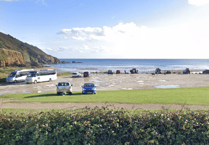Sewage pollution alerts have hit a number of local beaches this week.
On July 14, following a spate of bad weather, a number of local beaches were issued sewage pollution alerts. The alerts came from the Surfers Against Sewage (SAS) ‘Safer Seas and Rivers service’ app which provides real time alerts for beaches and rivers all over the UK.
The alerts began at 9.01am when a sewage pollution alert was issued for East Looe beach.
This was shortly followed by an alert in Millendreath at 9.30am. The next alert went off in Readymoney cove at 10.25am.
A short time later, an alert at Portwrinkle at 10.40am then Seaton at 10.50am, Kingsand at 10.55am, Par at 11.10am and lastly Cawsand at 11.20am.
On the SAS app, a sewage pollution alert means that “there has been a sewage discharge from a South West Water combined sewer overflow impacting this location within the past 48 hours.”
The SAS app alerts work by water companies in England and Wales voluntarily providing SAS with real time sewage alerts from sensors located on their combined sewer overflows which are then automatically sent to the app.
In total for 2023 there has been 26 alerts for East Looe beach, 53 alerts for Millendreath, 19 alerts for Fowey, 23 for Seaton, 11 for Portwrinkle, 10 for Kingsand, 27 for Par, and eight for Cawsand. These alerts are a combination of pollution risk alerts (a pollution risk forecast uses rainfall or other factors to make active forecasts of water quality risks, sewage pollution alerts, pollution incident alert (a confirmed incident) and maintenance.
A spokesperson from SAS explained: “SAS have been fighting to protect our oceans and coastlines for over 30 years. We are now demanding an end to sewage being discharged into our ocean by 2030. Raw untreated sewage can not only be a huge risk to human health, but can decimate our environment and wildlife. This horrendous situation is being ignored by the private water companies. They have been hiding behind excuses for too long. We demand change and we demand it now!”
A South West Water spokesperson has said: “There has been permitted storm overflow activity at some locations in Cornwall following heavy, localised rainfall. Storm overflows are pressure relief values built into our network that are an essential and regulated way to stop homes and businesses from flooding during periods of heavy rainfall.
“We know reducing their usage is an important issue for customers, as is the health of our rivers and seas – and it is one of our key priorities too. We are investing to dramatically reduce our use of storm overflows and reduce our impact on rivers by one-third by 2025. We have now installed monitoring on 100% of our storm overflows, helping us to target our investment and interventions to reduce spill numbers.”



.jpeg?width=209&height=140&crop=209:145,smart&quality=75)

Comments
This article has no comments yet. Be the first to leave a comment.